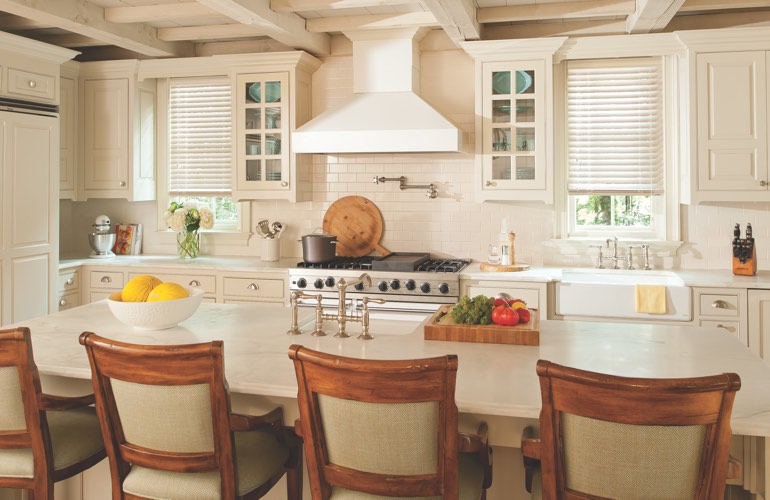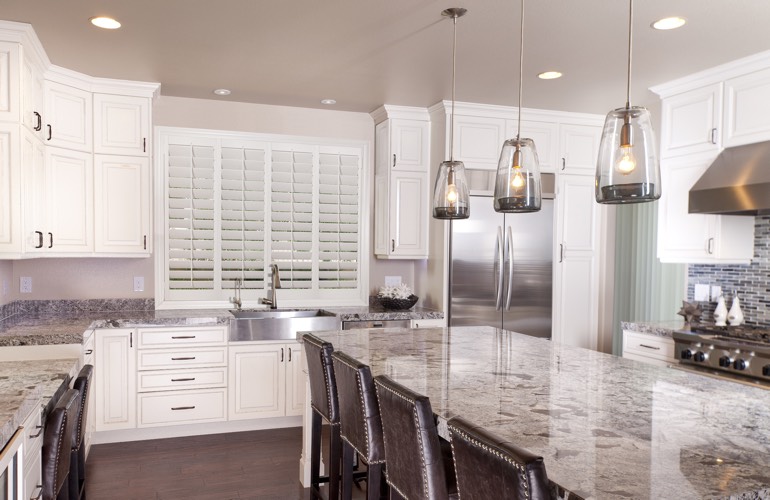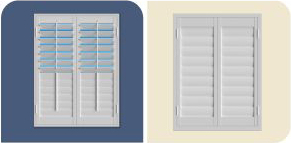
Why Some Homeowners In Chicago Confuse Plantation Blinds And Plantation Shutters
When Chicago homeowners give us a call for a quote, some ask for plantation blinds. But plantation blinds isn’t the right name of the window covering they‘re thinking of.
What most people refer to as “plantation blinds” are in fact plantation shutters.
The word “plantation” is synonymous with interior shuttersnot blinds. And “plantation” refers to the size and style of the horizontal louvers.
Blinds’ thin horizontal slats are not thick enough or wide enough to be considered “plantation” style.
Some consumers and even blind companies call blinds “plantation,” although that term has historically been associated with custom interior louvered shutters. Plantation shutters might look like blinds at a glance. But the differences between these two window treatments are numerous.
How Plantation Shutters Differ From Blinds


Plantation Shutters Are More Durable Than Blinds
Premium plantation shutters can be built from hardwood, reclaimed wood, or a synthetic wood. Any of these materials give you a sturdy window treatment that lasts for many more years than a blind. And when your shutters are painted with UV stabilizers, their color won’t fade.
Unlike shutters, blinds may have a rod to tilt the slats. And they have a series of cords to hold the slats up. Those two elements, as well as the thin slats, are susceptible to busting.
Blinds are also not effective at giving you control over temperature and light. And they tend to yellow after years in the sun, which is not the case with quality shutters.
They’re Highly Energy Efficient
Energy efficiency starts with the material a window treatment is made from. Plantation shutters, with their wood and synthetic wood louvers, are the most energy-efficient window treatment in Chicago. But it’s Polywood®’s exclusive weatherstripping that’s made to help block off airflow. That’s how Polywood is 1600% more energy efficient than an aluminum blind.
When the blind is closed, the slats aren’t tight against each other. There’s room on both sides of the blind where air can escape through. And holes are visible where the cords are. These issues make blinds less energy efficient compared to well-built plantation shutters that close with little to no gaps.
They Accentuate The Shape Of Your Window
Another thing to think about is that a rectangle is the only shape blinds come in. And if your window are octagonal, circular, arched, or triangular, blinds will cover up the shape rather than highlight it.
Plantation shutters however are ideal for specialty-shaped windows. They are custom built to every angle, corner, and arch. The completed product is a window treatment that operates smoothly. And it will look beautiful and makes the window shape pop.
They Give Your Home A Custom Look
You can buy blinds in a variety of colors, textures, and finishes. They can even be motorized or cordless. But however you mix and match their options, blinds don’t look as custom as shutters do.
Plantation shutters in Chicago are available in Polywood, Ovation® wood, and reclaimed wood. And there’s 300,000+ combinations of custom options of these window treatments to match your personal taste.
Shutters are usually installed with a frame that accentuates the corners and highlights the shutter panels. The interior shutters become a fashion statement that wows. And as a permanent feature of your home, they adds to its appraisal value.
An example of an exceptional way to customize your window treatments is to have the shutters made from reclaimed wood. No two shutter louvers - no two shutter panels - have identical marks, holes, or colors. It’s the ultimate custom window treatment you’ve been looking for in the Chicago area.


